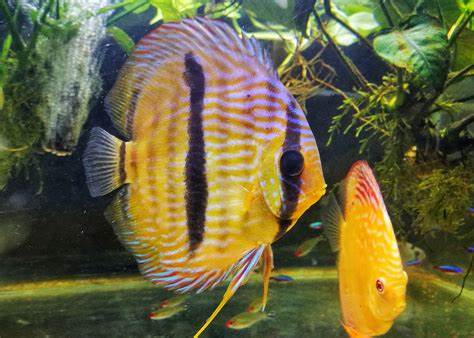My Store
HECKEL DISCUS- LGE
HECKEL DISCUS- LGE
Couldn't load pickup availability
🔵 Heckel Discus (Large) – The Holy Grail of Wild Discus Fish
The Heckel Discus (Symphysodon discus), often referred to as the "true wild discus," is a prized and revered species in the aquarium hobby. This large specimen is a standout, boasting a bold central vertical bar, rich blue and red coloration, and the classic body shape that defines the wild Amazonian aesthetic. Sourced from deep in the Rio Negro basin, the Heckel is a symbol of elegance, prestige, and the untamed beauty of the rainforest.
Unlike captive-bred discus strains, the Heckel offers a more authentic, natural coloration, and is perfect for advanced aquarists looking to build a true blackwater biotope or showcase a rare centerpiece fish with serious presence.
🐟 Species Profile:
-
Scientific Name: Symphysodon discus
-
Common Name: Heckel Discus
-
Size Offered: Large (5.5–6.5")
-
Temperament: Peaceful but sensitive
-
Tank Size: 75+ gallons (tall tanks recommended)
-
Water Parameters: 84–88°F | pH 4.8–6.0 | Soft, tannin-rich blackwater
-
Diet: Omnivore – thrives on beef heart mix, frozen bloodworms, discus granules
🛠️ Tank Setup & Compatibility:
Heckel Discus thrive in:
-
Blackwater setups with driftwood, Indian almond leaves, and dim lighting
-
Tall aquariums with excellent biological filtration and regular water changes
-
Species-only or peaceful community tanks with very stable water conditions
Compatible with:
-
Cardinal tetras, rummynose tetras, Corydoras, Apistogrammas (in very peaceful setups)
-
Avoid fast-moving, nippy, or aggressive tankmates
-
Best kept in groups of 4–6 with careful monitoring of water chemistry
Behavior:
-
👑 Regal and somewhat shy – prefers calm environments
-
🧠 Intelligent and sensitive to environmental changes
-
💨 Reacts dramatically to poor water quality – pristine conditions required
🛒 Why Buy from RobsAquatics.com?
Each Heckel Discus is:
-
✅ Hand-selected for clean central bar and natural wild coloration
-
✅ Carefully acclimated and conditioned in soft water
-
✅ Shipped with expert handling and Live Arrival Guarantee
-
✅ Ideal for discus collectors, Amazonian biotope builders, and advanced aquarists
📦 Add the crown jewel of the Amazon to your tank with a Large Heckel Discus—a rare, powerful presence that brings prestige and natural elegance to any freshwater display. Available now at RobsAquatics.com.
Share


